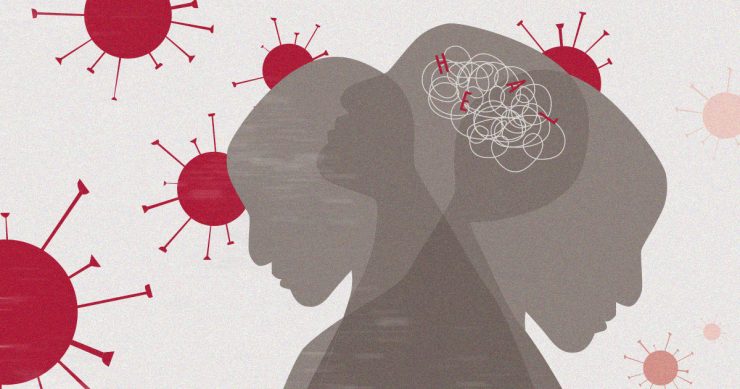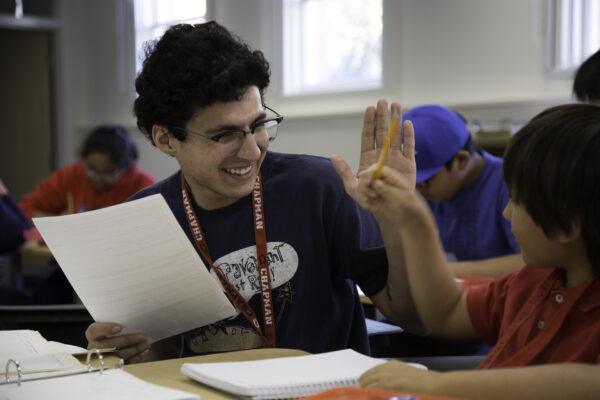Mary Kennedy knows about brain injury. After all, for more than 35 years she has worked with people to rebuild their cognitive abilities after those injuries.
Now she sees some of the same symptoms after mild brain injuries manifest in patients suffering the lingering effects of COVID-19.
“They’re having trouble with staying organized, remembering details and meetings, thinking of words that they want to use, being forgetful at home,” says Kennedy, Ph.D., professor of communication sciences and disorders at Chapman University.
Leveraging their clinical experience, Kennedy and speech-language pathologist Chantale Hucks are working with sufferers of long COVID to reclaim their lives.
“There are people who are living with some of these symptoms and trying to get back to work, back to school, back into their household duties – and some are really struggling,” says Kennedy, who teaches in the Communication Sciences and Disorders Department at Crean College of Health and Behavioral Sciences.
The Neuro-Deficit Clinic for COVID-19 Survivors, which was sparked by Kennedy and a donation from the U.S. Justice Charitable Foundation, is based at Chapman’s Rinker Health Science Campus in Irvine. The clinic serves people in person and through telehealth. Anyone can seek evaluation and treatment for free.
In fall, speech language pathology graduate students will get to work under supervision with people coming to the clinic.
“There aren’t a lot of university clinics that are currently seeing COVID clients with students. … It’s exciting that we can start training our students in this,” Kennedy says.
She and Hucks are working in an area still being explored in health care. According to researchers in the November 2021 edition of the journal Pathogens, post-COVID syndrome – now termed “post-acute sequelae of COVID-19” by the CDC and NIH – “does not have clear criteria for its prevention, diagnosis, and management tactics. … Various authors classify complications depending on the genesis, time of its onset, and the form of acute infection.”
“We’ve seen very few studies describing the communication problems someone can have after COVID,” Kennedy says.
If people who’ve had COVID are having attention or memory challenges, they’ll have a hard time communicating. They may forget the details of a conversation with a spouse in the morning, and in the afternoon tell their kids something that’s not accurate because their thinking is jumbled, she says.
“We’re trying to identify those communication problems and any factors that may be related,” she says.
Kennedy and her colleagues are working on evaluation and study protocols for pinpointing impairment and for finding differences, if any, between people who have long COVID symptoms and those who have fully recovered.
At Chapman’s clinic, a patient fills out questionnaires and a speech therapist interviews and evaluates them, then coaches them with strategies to help with things like focusing, remembering and finding the word they’re looking for. They address immediate needs and then the person’s long-term goals. The clinic is soon adding a part-time speech therapist.
“They then go about their week trying to use the strategy and then they come back and tell us the extent to which the strategy was useful. Did it work? Was it too much effort? Did they see that this could become a habit?” Kennedy says. “If the answer is, it was too much work, then we explore other strategies.”
Apps and services like Siri and Alexa have proven very helpful for patients trying to get back to normal, she says.
“One of the really positive things we’re noticing is that when people come to us for an evaluation and for assistance, most of them have already put some strategies in place, and we explore the extent to which those strategies are useful and help identify others,” Kennedy says.
The adults who have come to the clinic range in age, and the vast majority are working. The clinic is targeting people who are not connected to another long COVID clinic, since these people are likely not getting help, Kennedy says.
“We’re hoping there’s a lot more understanding and that society is less judgmental toward anyone with brain-related problems, such as those after COVID-19,” she says. “I think it’s reached so many people, so hopefully we’ll see an uptick in this kind of empathy.”
Kennedy thinks the clinic will also play a role in offering resources and education to people with long COVID.
“There really does seem to be a need for that,” she says. “A lot of primary care physicians still don’t know where to refer these folks or what kind of assistance is available for them.”





